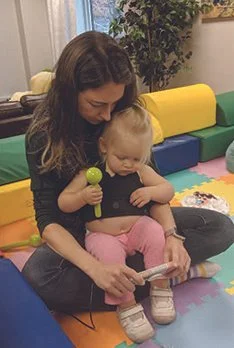Training Program Information
Training Program Information
The training faculty belong to 4 participating PhD programs, Psychological and Brain Sciences, Developmental change is multi-causal, the aggregate product of many nested processes operating over many time scales and interacting across many levels of analysis (from genes, to parent behaviors, to the language environment, and social groups). Because of this multi-causality there is nontrivial causal spread in which seemingly unrelated systems play causal, modulating or permissive roles in the development of other systems:
Early eye-hand coordination in object play sets the stage for (and predicts) later word learning. Sleep patterns (both those deriving from the intrinsic dynamics of the developing child and those resulting from chaotic parenting) play a causal role in the development of the neural systems underlying behavioral control. This complexity gives rise to a tangle of inter-related causes and effects that require multiple measures, large data sets, and new analytic approaches. To understand development, scientists need to go both deep and wide. The goal of this training grant is to provide young researchers - at the pre-doctoral and post-doctoral levels - the training to understand developmental process at multiple levels of analysis.
-Linda B. Smith, Director, Training Program in Integrative Developmental Process
Predoctoral and Postdoctoral Trainees
Our overall goal is to produce developmental scientists who bring new insight into the understanding of developmental process from a multi-leveled approach. We seek to train ethical scientists who are also good mentors and to increase diversity in the scientific community. This is our 31st year and we are proud to introduce our predoctoral and postdoctoral trainees for the 2025-2026 year.
How To Apply
Postdoctoral Trainees
Position: Appointments are normally for two years, conditional on satisfactory progress after the first year. Decisions regarding renewal are based on progress reports written by the trainee, mentor evaluations, and records of achievement (publications, presentations at conferences and meetings, awards). Stipend levels are set by NIH and based on levels of experience.
To apply: To apply, please send a CV, a statement of your research goals for the fellowship (indicating at least 2 faculty to serve as mentors), your earliest start date, and the names of three potential references. Please write "Multidisciplinary Training in Developmental Process" in the subject line of the email. Applications will be reviewed on a rolling basis. We have open lines beginning as early as March 1.
This training grant supports 3 postdoctoral and 5 predoctoral positions. Applicants must be US citizens or permanent residents. All applicants will be given equal consideration regardless of race, gender, or ethnicity. In addition, special efforts will be made to increase the diversity of our trainees.
Predoctoral Trainees
Appointments are normally for two years, conditional on satisfactory progress after the first year. Decisions regarding renewal are based on progress reports written by the trainee, mentor evaluations, and records of achievement (publications, presentations at conferences and meetings, awards). Stipend levels for all predoctoral trainees are set by NIH.
To apply: Contact your "home" department for an application to their Ph.D. program. When completing your application, be sure that you state that you are interested in the Multidisciplinary Training in Developmental Process, c/o Linda Smith, Department of Psychological and Brain Sciences, Indiana University, Bloomington, Indiana 47405.

